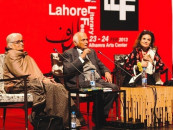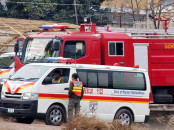Fahad murder case: SC disposes of suo motu notice
CJP Jamali directs parties to pursue matter before appropriate forum

Police booked the suspects for murder, attempted murder and rioting. Section 7 of the Anti-Terrorism Act, 1997, has also been inserted in the case since the police said the incident spread fear in society. PHOTO: FILE
Barrister Malik, a nephew of former Senate chairman Mohammad Mian Soomro, was killed early on the morning of August 15 in Islamabad’s F-10 area when he was attempting to mediate between two clashing parties.
After the incident, Chief Justice of Pakistan Anwar Zaheer Jamali had taken notice of the matter based on a note from the registrar of the apex court, stating the lethargic attitude of the police present at the time of the murder.
The note had stated that police, which saw the two parties clash, should have taken precautionary measures to prevent the incident while anticipating a potential escalation of the clash and a ‘breach of peace’.
“On account of the lethargic attitude of the police department, one of the accused initially succeeded in obtaining interim bail from the court of a district and sessions judge in Islamabad, which has now been cancelled, and the accused has been handed over to police on physical remand,” read the note.
While taking notice of the matter, the Supreme Court had issued a notice to the inspector general of Islamabad Police and directed him to submit a report.
Complying with the court’s orders, the investigation officer (IO) tasked with probing the incident, Inspector Muhammad Younas, appeared before the chief justice of Pakistan in his chamber along with SSP Islamabad Mir Vais for the case’s hearing.
During the Friday’s hearing, a detailed report of the incident along with record of investigation was also placed before the top judge.
The IO said that all investigations into the murder had been completed and the accused were now being tried before an Anti-Terrorism Court. The IO added that the ATC had earlier this week had ruled on an application from the suspects to drop anti-terror charges and to continue the murder case in a civil court.
Even though no notice had been issued to the legal team for the complainants in the case, Muhammad Akram Qureshi and Naveed Ahmad appeared before the chief justice in chambers.
They argued that the trial court’s order to remove section-7 of the Anti-Terrror Act from the the case had weakened the case and urged the CJP to restore it.
CJP Jamali, however, ruled that if the complainants had any grievance against the order of trial court, they may seek remedy in accordance with the law.
He further observed that no further steps were required to be taken in the suo moto case and subsequently disposed of it with the observation that aggrieved parties may pursue their remedy before the appropriate forum.
Published in The Express Tribune, December 24th, 2016.



















COMMENTS
Comments are moderated and generally will be posted if they are on-topic and not abusive.
For more information, please see our Comments FAQ